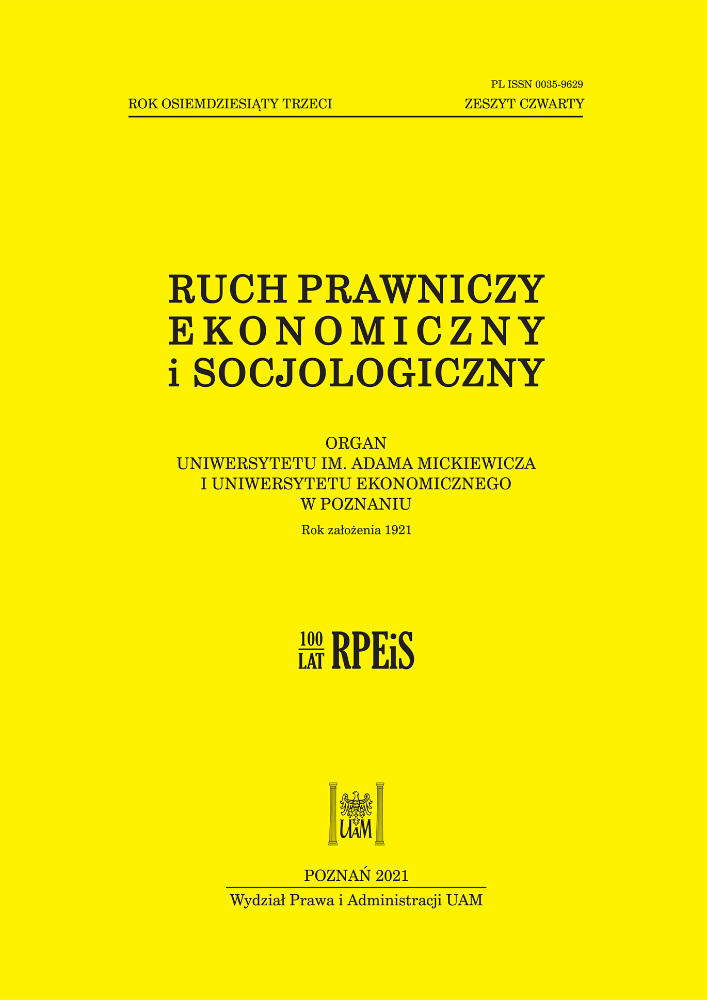Abstract
The aim of the article is to study a new regulation: the provision of Article 378a of the Code of Criminal Procedure (CCP), introduced with the amendment of 19 July 2019 in the context of fair trial standards. The right to defence, which is also an element of the fair trial standard, is vested in everyone from the moment when criminal proceedings are instituted against them until a final judgment is issued. It is important that the rights of defence must be procedural in order to be real and effective. The study refers to and discusses the following standards: constitutional, EU and Strasbourg, and then analyse the content of Article 378a of the CCP. The considerations lead to the conclusion that the possibility of taking evidence during the justified absence of the accused or his lawyer provided for in Article 378a of the CCP is incompatible with the current standards of a fair trial.
References
Hermeliński, W., Nita-Światłowska, B. (2019). Orzekanie pod nieobecność oskarżonego a gwarancje wynikające z przepisów rangi ponadustawowej. Palestra 9: 14–31.
Jasiński, W. (2019). Prawo dowodowe w postępowaniu przed Międzynarodowym Trybunałem Karnym oraz Europejskim Trybunałem Praw Człowieka, [w:] J. Skorupka (red.), System prawa karnego procesowego. Tom 8. Część 2. Warszawa: 1870–1887.
Karlik, P. (2020). Przepisy ogólne o rozprawie głównej, [w:] K. Gajowniczek-Pruszyńska, P. Karlik, Kodeks postępowania karnego. Komentarz do ustawy z 19.7.2019 r., Warszawa: 182–193.
Kłak, C. (2012). Pojęcie skutecznego środka odwoławczego w odniesieniu do przewlekłości postępowania w rozumieniu art. 13 EKPC a polska skarga na przewlekłość postępowania karnego, [w:] P. Czubik, Z. Mach (red.), Hereditas Mercaturæ. Księga pamiątkowa dedykowana świętej pamięci Stanisławowi Miklaszewskiemu. Kraków: 27–62.
Lach, A. (2018). Rzetelne postępowanie dowodowe w sprawach karnych w świetle orzecznictwa strasburskiego. Warszawa.
Treschel, S. (2005). Human Rights in Criminal Proceedings. Oxford.
Urbaniak, M. (2003). Rozpoznawanie spraw pod nieobecność oskarżonego w polskim procesie karnym. Poznań–Kalisz.
Ważny, A. (2020). Przepisy ogólne o rozprawie głównej, [w:] A. Sakowicz (red.), Kodeks postępowania karnego. Komentarz. Warszawa: 983–1008.
Wiliński, P. (2009). Rzetelny proces karny w świetle Konstytucji i orzecznictwa Trybunału Konstytucyjnego, [w:] P. Wiliński (red.), Rzetelny proces karny. Warszawa: 303–349.
Wiliński, P. (2011). Proces karny w świetle Konstytucji. Warszawa.
Zagrodnik, J. (2020). Przepisy ogólne o rozprawie głównej, [w:] J. Skorupka (red.), Kodeks postępowania karnego. Komentarz. Warszawa: 993–1065.
License
Copyright (c) 2021 WPiA UAM

This work is licensed under a Creative Commons Attribution-NonCommercial-NoDerivatives 4.0 International License.





